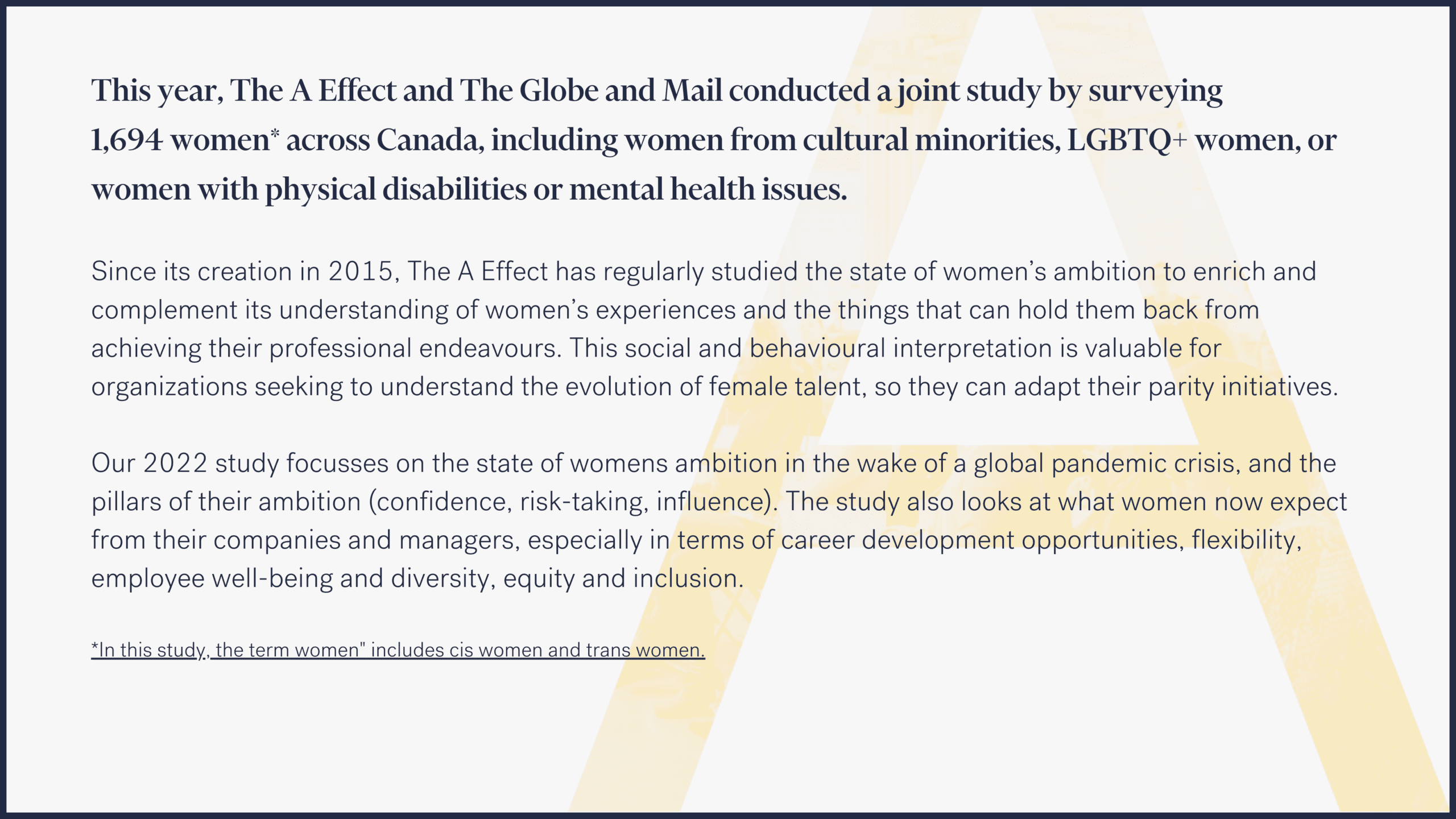Why Ambitious Women Want to Leave You


Ambition’s Current Barriers
In the wake of the pandemic, women are at the height of their ambition, eager to reach their full potential, eager for new knowledge and challenges. But despite a greater awareness of the existence of unconscious bias against women, barriers remain.
On one hand, there are internal, individual hurdles. Women cite a lack of self-confidence as the main obstacle to achieving their professional goals, followed by family obligations that affect professional choices. On the other hand, there is good news! Surveys conducted by The A Effect between 2016 and 2022 show that women in general are feeling more self-confident, less afraid of taking risks, and more empowered by their skills.
I realized that I was my own worst enemy. I was getting in my own way. The A Effect helped me realize this, and find fulfilment.
Mélanie Lavoie, Senior Vice President, Talent & Culture at VOSKER
However, while individual barriers may be lessening, there has been no change in terms of structural obstacles. Lack of career opportunities still tops the list, followed by lack of support from a superior, then lack of incentives in the company and the company’s male-centric corporate culture.
To thrive, female ambition needs true equal opportunity and more parity in decision-making. Without this, ambitious women are tempted to look elsewhere. So how can we move the needle before it’s too late?
Ambitious Brain Drain
Seven out of 10 Canadian women have considered leaving their jobs in the past year, compared to 1 in 10 people in the general Canadian population, according to Statistics Canada in August 2022. So why do women, especially those who say they are ambitious, want to leave their jobs and organizations?
For every woman at the director level who gets promoted to the next level, two women directors are choosing to leave their company.
The top reason cited in The A Effect and The Globe and Mail study is that women do not feel they are being paid what they’re worth. Surprisingly, they are not particularly proactive in negotiating their salaries: only 34% of the women surveyed asked for a raise in the last 12 months. There are many reasons that explain what may seem like a contradiction. From being conditioned as young girls to consider the topic of money taboo, to unconscious bias, women negotiate their salary less often and are quicker to accept a first offer, but at what price?
Women also still feel a strong imbalance between their professional and personal lives, and feel overwhelmed by the workload. Despite a slightly improved division of labour in the home during the pandemic, there is still a long way to go.
Finally, they feel that in order to get a promotion or a pay raise, they have to leave their company. That’s especially worrisome in the context of the talent shortage. Other important reasons for leaving a job according to our survey: ambitious women find it difficult to work with their manager or if that manager does not meet their expectations.
The World Economic Forum declared in its 2022 annual report that at the current rate of progress, it will take 132 years to achieve full parity: the pandemic has set back the achievement of parity by more than 32 years! However, some see the pandemic as an opportunity to renew ways of working, to update certain corporate values and most of all, rethink a more inclusive employee experience.
Rethink Talent Development for Better Retention
A worldwide study conducted by the American management consulting firm McKinsey, reveals that companies with more women in management positions are 25% more likely to generate above-average profits.
Ambition propels talent to higher levels. When properly supported, ambition drives performance. It promotes greater diversity, better engagement of teams of ambitious women and ambitious women individually, improved capacity for innovation and risk-taking, more effective collaboration between teams, and better retention of talent (The A Effect – Leger 2020 study). It’s an irresistible energy and a powerful lever for growth through action, and it broadens the scope for greater diversity within organizations.
Failing to clearly support women’s ambitions is taking the risk of depriving ourselves of their talent. So what are you going to do to create the conditions necessary to mobilize ambitious women?
[Being the only woman,] having a different voice, it has a lot of value, but it can have an impact on your self-confidence because you feel alone. This is why I build diverse teams.
Kathy Cunningham, Chief Financial Officer, Globe and Mail








